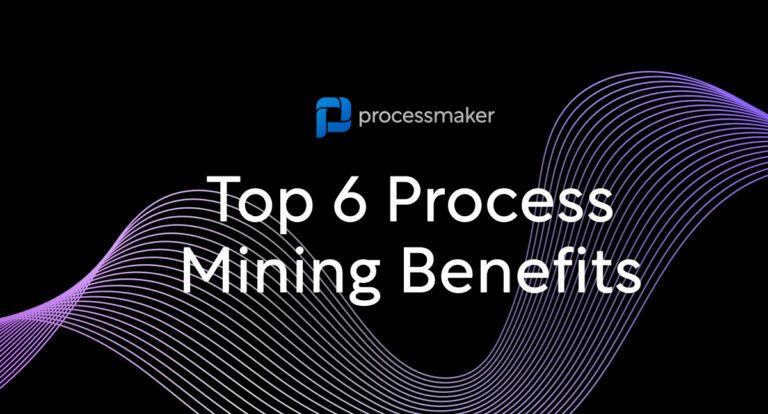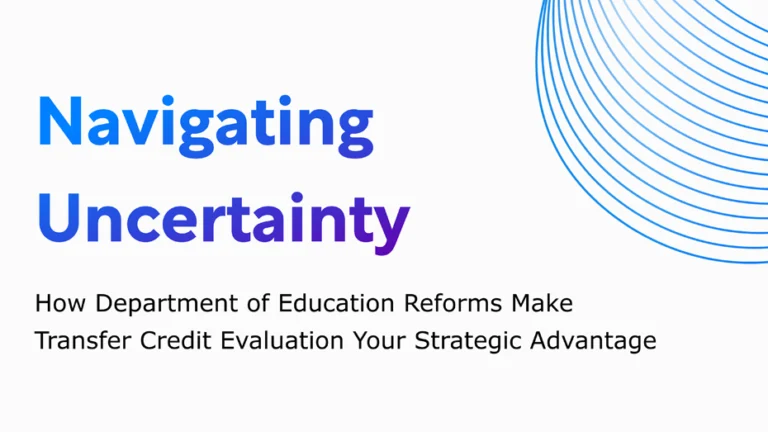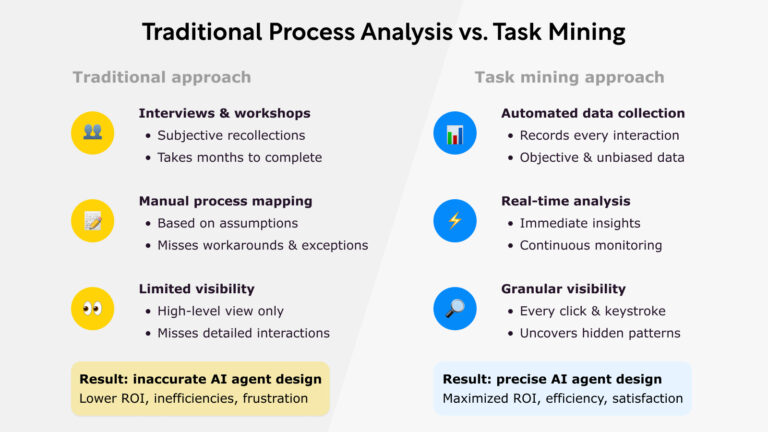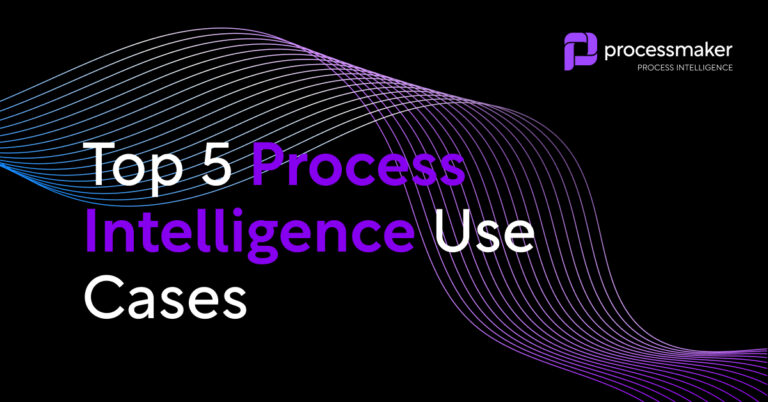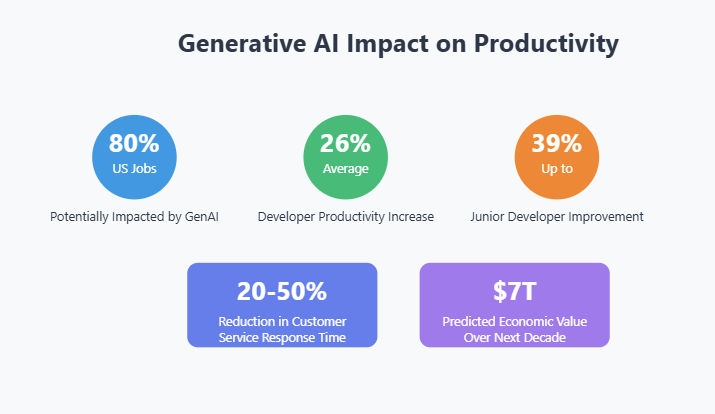Process mining has emerged as a powerful tool for analyzing and improving business processes. In this article, we will explore the six key benefits of process mining as identified by a recent study by Deloitte and HFS Research.
What is process mining?
Process mining software helps you discover, analyze, and improve business processes using advanced data mining methods. This innovative technology helps you discover, analyze, and improve business processes using advanced data mining methods. Process mining is seen as an objective and data-driven way to evaluate the real state of processes and workflows in an organization. Process mining is the intersection of business process management and data science. In this way, process mining tools interact with business software systems to extract process information, typically in the form of event logs or business objects, for the purpose of process analysis and business process improvement. Process mining algorithms and dashboards give visibility to end-to-end processes, thus providing companies with valuable data that can be used to improve business operations and reach better company performance. In this way, it’s like an x-ray to the company workflows and processes.
Process Mining vs Task Mining
Task mining and process mining are two approaches that help organizations improve their operations through data analysis, but they serve different purposes. Process mining focuses on visualizing and analyzing entire business processes by extracting knowledge from event logs to identify bottlenecks, inefficiencies, and variations in workflows. On the other hand, task mining delves into the specific actions of individual users, capturing their interactions with applications to uncover insights about how tasks are completed. While process mining provides a high-level overview of the process landscape, task mining offers granular insights into daily activities, enabling businesses to optimize both their processes and workflows effectively.
Six Key Benefits of Process Mining
Deloitte and HFS Research recently asked over 100 enterprise leaders in large business organizations about the state of process mining in 2023. One key outcome is a detailed view of the six key benefits process mining brings today. 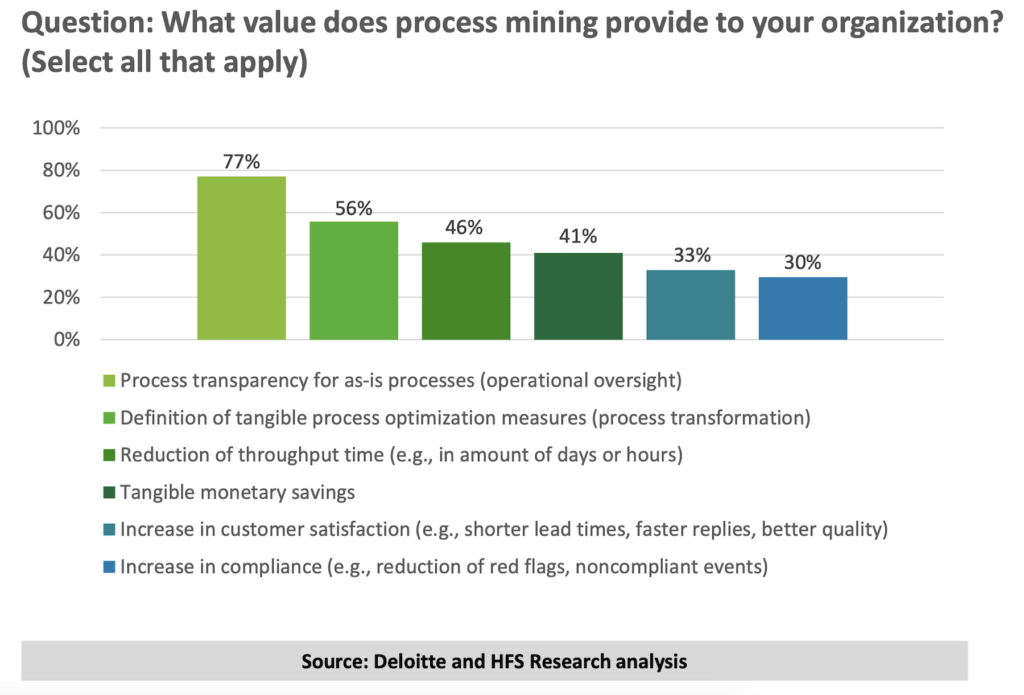
Source: Global Process Mining Survey, Deloitte, 2023
1. Process Transparency
Over 77% of enterprise leaders find process transparency to be the top value brought by process mining tools. You can think of this as being a detailed x-ray of the health of processes and workflows in an organization.
Understand As-Is Process
One of the most significant advantages of process mining is its ability to provide a clear, data-driven view of the current state of a business process. By analyzing event logs, process mining tools can automatically create visual process models, enabling organizations to see exactly how their processes are functioning. This transparency helps stakeholders understand the process flow, identify inefficiencies, and make data-driven decisions.
Identify Inefficiencies
With process transparency, organizations can quickly spot inefficiencies and deviations from the intended process flow. This visibility allows businesses to identify the areas and root causes where resources are being wasted, tasks are being duplicated, or processes are not adhering to standard operating procedures. By addressing these issues, organizations can make significant improvements in process performance.
2. Process Transformation
The second key benefit of process mining to enterprise leaders is in support of process transformation. Process intelligence plays a crucial role in process transformation by leveraging data-driven insights to enhance automation initiatives. 56% of survey respondents felt process mining gives tangible process optimization insights and measures.
Optimize Process Models
Once the current state of a process has been analyzed, process mining tools can help organizations optimize their process models. By comparing the as-is process model to the happy path or intended process, organizations can identify areas for improvement and develop strategies to transform their processes. This could involve redesigning process flows, automating manual tasks, or implementing new policies and procedures.
Continuous Improvement
Process mining facilitates a culture of continuous improvement within organizations. By regularly analyzing process data, businesses can monitor the impact of their process changes and ensure that improvements are sustained over time. This ongoing analysis enables organizations to stay agile and adapt quickly to changing market conditions, customer demands, and regulatory requirements.
3. Reduction in Throughput Time
The third key benefit of process mining is the ability to reduce throughput time. In other words, almost half of all respondents had seen process mining helping to streamline and speed up end-to-end processes.
Identify Bottlenecks
Process mining helps organizations identify bottlenecks in their processes, which can significantly impact throughput time. Bottlenecks occur when a process step has a limited capacity or resources, causing delays and inefficiencies in the overall process flow. By pinpointing these bottlenecks, organizations can prioritize improvement efforts and make targeted changes to their processes.
Streamline Processes
Reducing throughput time is often achieved by streamlining processes, which can involve eliminating unnecessary steps, automating manual tasks, or reallocating resources. Process mining provides the data and insights necessary to make informed decisions about how best to streamline processes, resulting in faster execution, reduced waiting times, and ultimately, improved efficiency.
4. Cost Savings
The fourth key benefit of process mining to enterprise leaders is tangible monetary savings. Over 40% of respondents to the Deloitte and HFS Research survey had found ways it reduced costs.
Reduce Manual Efforts
One of the most tangible benefits of process mining is its ability to identify opportunities for automation and the reduction of manual efforts. By pinpointing tasks that are repetitive, time-consuming, or prone to human error, organizations can implement automation solutions that not only save time but also reduce labor costs.
Minimize Waste
Process mining can help organizations minimize waste by identifying inefficiencies, redundancies, and deviations from standard procedures. By addressing these issues, businesses can reduce resource consumption, avoid costly rework, and improve overall process efficiency, leading to significant cost savings.
5. Improved Customer Satisfaction
The fifth key benefit of process mining for enterprise leaders is improved customer satisfaction. Process mining is becoming increasingly popular in digitalized service businesses where the efficiency of processes can have a tangible impact on how quickly and accurately customers get service.
Faster Response Times
By reducing throughput time and streamlining processes, process mining can help organizations deliver products and services more quickly, resulting in faster response times for customers. This increase in speed can lead to higher customer satisfaction, as customers are more likely to have a positive experience when their needs are met promptly.
Enhance Customer Experience
Beyond just faster response times, process mining can also help organizations enhance the overall customer experience. By identifying inefficiencies and pain points within customer-facing processes, businesses can make targeted improvements that directly impact the customer journey. This could involve reducing the number of steps in a process, simplifying interactions, or implementing new communication channels.
6. Increased Compliance
If process mining wasn’t already hugely valuable, enterprise leaders also found that it has a proven benefit to workflow compliance.
Monitor Regulations
In today’s increasingly regulated business environment, ensuring compliance with laws, regulations, and industry standards is essential. Process mining can help organizations monitor their adherence to these requirements by providing a transparent view of their processes and highlighting potential compliance risks.
Reduce Compliance Risks
By identifying and addressing deviations from standard procedures, process mining can help organizations reduce their exposure to compliance risks. This proactive approach to compliance management not only helps businesses avoid fines, penalties, and reputational damage but also fosters a culture of transparency and accountability.
The Bottom Line
In conclusion, process mining offers numerous benefits to organizations seeking to optimize their business processes. By providing process transparency, facilitating transformation, reducing throughput time, cutting costs, improving customer satisfaction, and increasing compliance, process mining has become an indispensable tool for businesses looking to stay competitive and agile.
FAQs:
1. What is process mining?
Process mining is a technique that analyzes event logs to create visual process models, providing valuable insights into the current state of a business process and identifying areas for improvement. 2. How does process mining contribute to cost savings? Process mining helps organizations identify inefficiencies, redundancies, and deviations from standard procedures, enabling them to reduce resource consumption, avoid costly rework, and improve overall process efficiency, leading to significant cost savings. 3. How does process mining support compliance efforts? Process mining provides a transparent view of business processes, allowing organizations to monitor their adherence to laws, regulations, and industry standards. By identifying and addressing deviations from standard procedures, businesses can reduce their exposure to compliance risks. 4. Can process mining improve customer satisfaction? Yes, by reducing throughput time and streamlining customer-facing processes, process mining can help organizations deliver products and services more quickly, resulting in faster response times and an enhanced customer experience. 5. Is process mining suitable for all industries? While process mining can be applied across various industries, it is particularly beneficial for businesses with complex processes and high volumes of data. These organizations can leverage process mining to gain valuable insights into their processes and drive significant improvements in efficiency, cost savings, and customer satisfaction.
